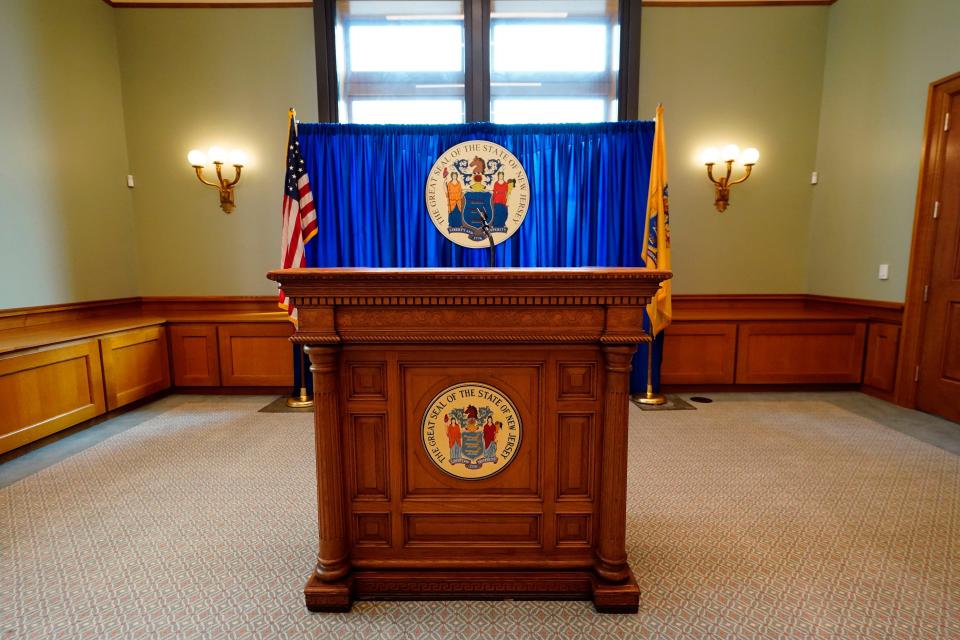Liquor license reform and raises for lawmakers: Two bills head to Gov. Phil Murphy's desk
- Oops!Something went wrong.Please try again later.
- Oops!Something went wrong.Please try again later.
Two bills introduced during the waning days of the lame-duck legislative session — one that reforms the way New Jersey administers liquor licenses and another that raises the salaries of lawmakers, judges and other public officials — are headed to the governor’s desk.
Liquor license reform package draws unanimous support
The first would reduce event restrictions facing breweries, distilleries, cideries and meaderies, takes steps to put inactive liquor licenses back into circulation and adds a special license for businesses at malls. It comes after similar legislation was approved last year but was met with a conditional veto from Gov. Phil Murphy.
The new bill, S4265, which took some of the governor’s recommendations into consideration, received unanimous support in the Senate and Assembly. Liquor license reform has been a hot topic for nearly a year, and the latest efforts are a compromise of what both the Legislature and the Murphy administration have been pushing for.

This is the latest in a line of bills aimed at addressing what Murphy called an “antiquated” system during last year’s State of the State address.
The legislation would allow New Jersey breweries, cideries, meaderies and craft distilleries to hold an unlimited number of on-premises special events and private parties as well as 25 off-premises special events and 25 social affair events.
It also would allow them to offer certain types of food and coordinate with food vendors.
It would create a farm brewery license, whose holder — if actively engaged in farming — would be able to make up to 2,500 barrels of any malt alcoholic beverages per year. There is already a farm winery license for $375 to produce up to 50,000 gallons of wine per year, provided that the licensee is using locally grown products to produce the wine.
'A good compromise': NJ liquor license reform bill moves forward for state Senate vote
The brewery version would be similar, in that licensees would have to use locally grown farm products in brewing malt beverages, which would be sold at the farm.
So-called pocket licenses — inactive licenses that exist in towns throughout the state — are also addressed.
The bill would require all inactive licenses to be used or transferred to another person or municipality. If they aren’t, they would expire at the end of their terms unless conditions are met. The stipulation on transfers between municipalities, though, is that they would be allowed only to bordering towns.
Municipalities would also be able to issue special licenses for businesses at shopping malls. There would be two allowed in each town for malls of at least 750,000 square feet and four for malls of 1,500,000 square feet.
The new bill does not address Murphy’s call to expand the liquor license program overall, something he said would benefit small family-owned restaurants, calling them the “heart and soul of many of our communities and downtowns.”
Raises coming: Bill to raise NJ lawmakers' salaries moves forward to seek full state Senate approval
Votes on legislative raises split along party lines in both chambers
The second bill would give raises to judges, legislative staff and lawmakers. The legislation also increases the allowance given to legislators to pay their staffs.
This legislation did not enjoy the overwhelming support that the brewery bill did. Votes in both chambers were split largely along party lines, with 46 in favor and 26 opposed in the Assembly and 26 in favor, seven opposed and seven not voting in the state Senate.
Many Republicans questioned the soundness of the raises.
The bill increases the annual salary for members of the Legislature from $49,000 to $82,000, starting in 2026. Legislators are considered part time and haven’t seen a raise since 2002. They would also see an increase in the allowance they receive for their staff. It will go from $135,000 to $150,000.
There are several roles that would see a $35,000 raise, from $175,000 to $210,000 each year. The governor would qualify for that raise, though it won’t go into effect until 2026, after Murphy leaves office.
The executive director of each full-time legislative staff for both parties in both chambers and the executive director of the Office of Legislative Services as well as members of the governor’s Cabinet would also receive that boost, but in those cases it would begin in 2024.
Lt. Gov. Tahesha Way, who also serves in the Cabinet as secretary of state, would be the exception. That role would not see an increased salary go into effect until 2026. The rest of the Cabinet last got a raise in 2018.
The annual salary adjustment for justices and judges that started in January 2021 based on the change in the Consumer Price Index would remain in effect until 2027. The bill also establishes $207,166.50 as the salary for presiding judges of the Superior Court and the Tax Court.
Katie Sobko covers the New Jersey Statehouse. Email: sobko@northjersey.com
This article originally appeared on NorthJersey.com: NJ liquor license reform, lawmakers' pay raise bills head to Murphy

